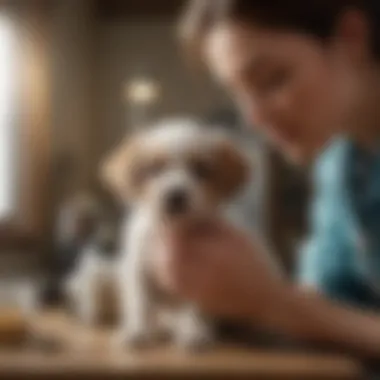What to Do If My Puppy Has Diarrhea: A Comprehensive Guide


Being attentive to your puppy's needs and surroundings will significantly contribute to their overall health and comfort. By following the guidelines laid out, owners can handle the situation of diarrhea with greater knowledge and capability. It is crucial to keep monitoring your puppy and seek veterinary assistance if symptoms persist or worsen.
Understanding Diarrhea in Puppies
Understanding diarrhea in puppies is critical for any pet owner. This knowledge enables owners to recognize potential health issues quickly and respond appropriately. Diarrhea is not just a minor inconvenience; it can lead to serious health problems if left unchecked. Offering insights into the definition, symptoms, and types can equip pet owners with the foundational information needed to make informed decisions regarding their puppy's health.
Definition of Diarrhea
Diarrhea is characterized by frequent, loose, or watery stools. In puppies, it is essential to monitor changes in stool consistency, as it can signal various health issues. Normally, a healthy puppy will have firm stools at regular intervals. When these become unusually soft or excessive, it raises red flags worth investigating.
Common Symptoms
In addition to watery stools, there are several symptoms that may accompany diarrhea in puppies. The following list outlines common signs:
- Increased frequency of bowel movements
- Straining during defecation
- Abdominal discomfort or bloating
- Lethargy or uncharacteristic behaviors
- Vomiting or loss of appetite
Recognizing these symptoms early can assist in addressing the underlying cause of diarrhea swiftly.
Types of Diarrhea
Diarrhea in puppies can present in various forms, each indicating different underlying issues. The main types include:
- Acute Diarrhea: This is sudden and usually lasts a short time. It can be due to dietary changes or infections.
- Chronic Diarrhea: This variety persists for an extended period and may signify more serious health problems.
- Non-infectious Diarrhea: Often linked to dietary issues or allergies.
- Infectious Diarrhea: Caused by viruses, bacteria, or parasites. Each type requires different approaches for diagnosis and treatment.
Understanding these distinctions is valuable for pet owners when consulting with veterinarians or exploring care options.
Potential Causes of Diarrhea in Puppies
Understanding the potential causes of diarrhea in puppies is essential for pet owners. This knowledge helps in identifying the right course of action to take when faced with this common ailment. Diarrhea can be a symptom of a range of issues, from simple dietary changes to serious health conditions. Awareness of these causes allows puppy owners to respond effectively, ensuring their pet's health is maintained and risks are minimized.
Dietary Issues
Dietary issues are among the most frequent causes of diarrhea in puppies. Changes in diet, whether from switching dog foods or introducing new treats, can upset a puppy's sensitive stomach. Puppies may also experience diarrhea due to eating spoiled food or garbage. It's crucial to observe what a puppy consumes and make transitions in diet gradual.
Additionally, some dogs have food intolerances or allergies, leading to gastrointestinal distress. Common allergens include beef, chicken, dairy, and wheat. Being mindful of how a puppy's diet impacts its digestive health is essential. Keeping a food diary, noting what is fed and any reactions, can help identify problematic foods.
Infections and Parasites
Infections and parasites can significantly disrupt a puppy's digestive system. Viruses, such as parvovirus or distemper, are notorious for causing severe diarrhea. These infections often come with other accompanying symptoms, such as vomiting and lethargy.
Parasites like giardia or roundworms can also lead to diarrhea. They can be contracted from contaminated water, soil, or feces. Regular veterinary check-ups and maintaining a clean living environment can help prevent these health issues. Recognizing the signs of infections or parasitic infestations early can lead to better outcomes for treatment and recovery.
Stress and Environmental Changes
Stress and environmental changes play a crucial role in a puppy’s health. A new home, changes in routine, or the introduction of new pets can provoke anxiety in puppies. This anxiety can manifest in gastrointestinal issues, including diarrhea.


It is vital to provide a supportive and stable environment for a puppy to thrive. Gradual introductions to new situations can help reduce stress. If a puppy shows signs of stress-related diarrhea, adjusting its environment and routine may improve its condition.
Underlying Health Conditions
Underlying health conditions can predispose puppies to diarrhea. Issues such as inflammatory bowel disease, liver dysfunction, or pancratitis can reveal themselves through gastrointestinal symptoms. If diarrhea persists, it is crucial to consult a veterinarian. They may recommend tests to identify any serious health problems.
Understanding these potential causes of diarrhea in puppies is crucial for effective decision-making when addressing this common issue. Identifying the root cause leads to appropriate treatment and supports overall health.
Assessing the Situation
Assessing the situation when your puppy has diarrhea is a crucial step in determining the best course of action. Understanding the frequency, severity, accompanying symptoms, and the duration of diarrhea can provide valuable insights for treatment options and help you decide whether a veterinarian's intervention is necessary. Taking a methodical approach to evaluate these elements can prevent escalation and ensure a safer recovery for your pet.
Frequency and Severity
The frequency and severity of your puppy's diarrhea can reveal important information about their health. If the diarrhea occurs infrequently, it may be less concerning than when it occurs multiple times in a single day. For instance, one or two soft stools could indicate a minor upset, such as a dietary indiscretion, whereas a significant increase, say five or more times within hours, necessitates closer attention.
Additionally, consider the severity of the stool itself. Watery consistency might suggest a more urgent issue compared to mildly loose stools. Keeping track of these occurrences can aid in providing accurate details to your veterinarian if you need to seek professional help.
Accompanying Symptoms
Accompanying symptoms can greatly change the context of diarrhea. Factors like vomiting, lethargy, or unusual behavior could signify that the issue is more serious than simple dietary changes. Symptoms such as fever or significant lethargy indicate that the puppy may be in distress. Monitoring their body temperature can also offer insight, since a high temperature may call for immediate veterinary assistance. Assessing these additional symptoms is important, as they help to create a more comprehensive picture of your puppy's health status.
Duration of Symptoms
The duration of diarrhea plays a significant role in your assessment. Diarrhea lasting less than 24 hours might not require immediate veterinary intervention, especially if your puppy appears otherwise healthy. However, if the diarrhea persists longer than 24 hours, this is a red flag. Such a duration could lead to dehydration, where the puppy might show signs like excessive thirst, dry gums, or lack of skin elasticity. Always be cautious of the timeline, as prolonged diarrhea could reflect underlying health issues necessitating medical attention.
It is essential to observe and document frequency, severity, accompanying symptoms, and duration to provide your veterinarian with the best information possible for diagnosis and treatment.
Immediate Care Practices
Immediate care practices are critical for ensuring your puppy recovers swiftly and comfortably from diarrhea. When faced with this issue, following targeted approaches can significantly alleviate discomfort and support overall health. It is imperative to focus on hydration, dietary adjustments, and behavioral monitoring to manage the condition effectively.
Hydration Importance
Hydration is fundamental when your puppy has diarrhea. Diarrhea leads to rapid fluid loss, which risks dehydration. Young puppies are especially vulnerable. Symptoms of dehydration can include lethargy, dry gums, and skin elasticity loss. To prevent such complications, ensure your puppy has constant access to clean, fresh water.
Encourage them to drink regularly, and consider offering electrolyte solutions designed for pets. Products like Unflavored Pedialyte can be suitable, but always consult your vet before giving them any new substances. If your puppy refuses to drink, try using a syringe to administer diluted water slowly.
Adjusting Diet Appropriately
Food plays a significant role in the recovery of a puppy with diarrhea. It's essential to adjust their diet and provide bland food sources that are easy to digest. Consider options such as boiled chicken and rice or plain pumpkin. These foods help firm up their stool without causing further irritation.
You should gradually introduce these food changes. Begin with small portions and observe how your puppy reacts. It is best to avoid rich or heavy foods during this time. Refrain from giving treats or table scraps until the diarrhea resolves completely, as these can exacerbate the issue.
Monitoring Behavior and Appetite


Monitoring your puppy's behavior and appetite is a vital part of immediate care. Ensure you keep an eye on your puppy's general demeanor. A decrease in energy or reluctance to engage in usual activities can signal that they need additional care.
Observe their appetite. If your puppy displays no interest in food for more than 24 hours, or if the diarrhea persists, it may indicate a more severe underlying problem. Keeping a detailed record of their condition, including stool consistency and frequency, can be helpful in discussing symptoms with your veterinarian.
Regular monitoring enables you to identify changes in your puppy’s health that may require professional intervention.
In summary, addressing hydration, adjusting diet, and closely monitoring behavior and appetite are all necessary practices to care for a puppy experiencing diarrhea. These immediate interventions can lead to a quicker recovery and help maintain your puppy's overall well-being.
When to Seek Veterinary Help
When a puppy experiences diarrhea, many owners may feel uncertain regarding the necessity of a vet visit. Knowing when to seek veterinary help is crucial for the health of your puppy. Early intervention can prevent complications. Understanding specific signs can aid owners in making informed decisions about their puppy's health.
Signs of Severe Dehydration
One major concern associated with diarrhea is dehydration. Puppies can lose a significant amount of fluids quickly. Identifying signs of severe dehydration is essential. Some symptoms to watch for include:
- Lethargy: If your puppy is unusually weak or tired, this may indicate dehydration.
- Excessive thirst: While an increased desire to drink can be normal, if it seems abnormal, it may be a sign of dehydration.
- Dry gums: Gums that appear dry or sticky can be a concerning sign of low hydration levels.
- Loss of skin elasticity: Gently pinch the skin; if it does not return quickly to its normal position, dehydration is likely.
If you observe any of these symptoms, it is important to contact a veterinarian promptly.
Presence of Blood in Stool
Seeing blood in your puppy's stool can be alarming. Blood may appear as red streaks or a darker color. This can indicate a more serious health issue. Potential causes include:
- Intestinal parasites: Such as roundworms or hookworms.
- Infections: Some viral or bacterial infections can lead to bloody diarrhea.
- Dietary indiscretion: If your puppy eats something harmful, it could cause intestinal irritation.
Blood in the stool is not normal and warrants immediate veterinary attention. Diagnosing the cause is crucial for safe treatment.
Prolonged Diarrhea Duration
Duration is another critical factor in assessing the need for veterinary help. If diarrhea lasts more than 24 hours, it’s time to consult with a veterinarian. Prolonged diarrhea can lead to:
- Secondary infections: As the body loses defenses.
- Nutritional deficiencies: Due to inability to absorb essential nutrients.
- Worsening dehydration: Especially in young or small breeds.
All these factors highlight that extended diarrhea is a significant health concern, and veterinary assessment is needed. Don’t ignore symptoms; acting swiftly often provides the best outcomes.
Remember: It’s always better to err on the side of caution. When in doubt, consulting with a veterinarian can provide peace of mind and essential guidance.
Treatment Options
When a puppy experiences diarrhea, understanding the available treatment options is vital. The right approach not only aids in recovery but also ensures the puppy's overall well-being. It is essential to consider several factors, including the underlying cause of the diarrhea, the puppy's age and size, and any additional symptoms.
Medication Prescriptions
In some cases, veterinarians may prescribe medication to address the causes of diarrhea. This is particularly the case when diarrhea is linked to infections, parasites, or other underlying health issues. Medications like metronidazole or fenbendazole are commonly used for treating parasitic infections, while probiotics can help restore gut flora.


It is crucial to follow the veterinarian's guidance regarding dosages and duration. Self-medicating with over-the-counter drugs can be dangerous, as some may not be suitable for puppies. Additionally, an incorrect dosage could lead to further complications or ineffectiveness. Always consult with a vet before administering any medication.
Home Remedies: What’s Safe?
While waiting for veterinary care or if the case seems mild, some pet owners may consider home remedies. Certain natural options can be safe and effective. For instance, plain boiled chicken and rice can be gentle on a puppy's stomach. This bland diet eases digestion while providing necessary nutrients.
However, it's vital to be cautious. Not all home remedies are suitable. Solutions like pumpkin or slippery elm can sometimes help, but other ingredients can exacerbate the condition. Always research any remedy thoroughly and consult a veterinarian if unsure.
Long-term Dietary Adjustments
After recovery from diarrhea, long-term dietary adjustments may be necessary to prevent future occurrences. Transitioning to a high-quality, easily digestible diet can support a puppy's digestive health. Avoid rapid changes in diet that can upset a puppy's stomach. It’s best to introduce new foods gradually over several days.
Monitoring the puppy's reaction to any dietary change is essential. If there are signs of discomfort, such as continued loose stools or lack of appetite, it may be time to consult a vet for a more tailored dietary plan. Regular bowel habit monitoring can highlight potential issues before they become serious, ensuring better digestive health for the puppy.
Important: Any treatment approach should be tailored to the individual puppy's needs and always discussed with a veterinary professional.
Preventative Measures
Preventative measures are crucial when it comes to maintaining your puppy's health, especially in relation to digestive issues like diarrhea. Proactive strategies can minimize the risk of diarrhea and its impact on your puppy's well-being. The significance of these practices cannot be overstated, as they lay the foundation for a healthy and robust puppy.
Proper Feeding Practices
Establishing proper feeding practices is vital for preventing diarrhea in puppies. Start by selecting high-quality puppy food that meets the nutritional needs of growing dogs. Ensure that any dietary changes are made gradually to avoid upsetting your pup's stomach. For instance, if you are switching foods, do so over a week, mixing the old food with the new one.
The feeding schedule also matters. Puppies benefit from consistent meal times, which helps regulate their digestive systems. It's advisable to avoid giving table scraps or high-fat treats too frequently. Such foods can lead to gastrointestinal upset. Additionally, make sure your puppy has access to fresh water at all times. This will help prevent dehydration, especially if they do experience diarrhea.
Maintaining a Clean Environment
Maintaining a clean environment is another essential preventative measure. Puppies are naturally curious and may explore areas that could expose them to harmful bacteria or parasites. Regularly cleaning your puppy’s living space reduces the risk of infections that could contribute to diarrhea.
Use safe cleaning products when sanitizing their area. Ensure that you regularly clean food and water bowls to avoid any residue that might grow bacteria. Also, be mindful of where your puppy eliminates. Cleaning up promptly after your puppy helps prevent any contamination of their living areas that could lead to health issues.
Regular Health Check-ups
Regular health check-ups with a veterinarian are an essential component of preventative care. These visits allow for early detection of any potential health problems before they become serious. Your vet can administer vaccinations that protect against infections that could cause diarrhea. Moreover, during these checks, your vet can also check for parasites, which are a common cause of diarrhea in young dogs.
Creating a routine for these check-ups can facilitate good health management for your puppy. Discuss diet, behavior, and any changes you notice with your veterinarian. Such open communication can lead to tailored advice that helps ensure your puppy's long-term health.
Regular preventative care not only supports your puppy's immediate health but contributes to their overall quality of life.
Culmination
The final section of this guide is crucial in reinforcing the importance of timely and effective action when a puppy experiences diarrhea. Recognizing the various aspects of this condition is essential for pet owners. A prompt response not only aids in symptom management but also helps in preventing further health complications.
Summary of Key Points
Understanding the reasons behind your puppy's diarrhea can assist in addressing the issue correctly. Key points include:
- Identifying Symptoms: Quick recognition of signs like frequency, severity, and duration can guide necessary actions.
- Hydration is Critical: Maintaining proper hydration should be a top priority, as diarrhea can lead to dehydration rapidly.
- Veterinary Consultation: Knowing when to seek veterinary help is essential. If severe symptoms arise, professional input is important.
- Careful Treatment Choices: Understanding safe treatment options will ensure your puppy gets the right help without unnecessary risks.
Final Thoughts on Puppy Health
Ultimately, the health of your puppy hinges on vigilance and care. It's important to create a proactive environment where your pet is assessed regularly for signs of illness. By being informed about what to do in situations like diarrhea, you can contribute to your puppy's overall well-being. While it can be troubling for both the pet and the owner, with knowledge and timely intervention, these issues can usually be managed effectively. Always prioritize your puppy's health by staying observant and informed.



